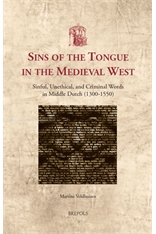As modern medievalists have repeatedly established, harmful speech conduct (‘sins of the tongue’) aroused considerable interest among medieval authors. Lying, boasting, flattering, railing, backbiting, grumbling, false swearing, and garrulous and incendiary speech were but a few of the speech acts that provoked moral condemnation all over Western Europe from the thirteenth century onward.
This study examines medieval notions of harmful speech conduct as reflected in Middle Dutch ecclesiastical, secular-ethical, and legal textual sources. According to these texts, the tongue was able to ‘break bones’ and inflict considerable damage on the speaker, on listeners, and on other relevant participants in speech situations.
The book utilises two novel approaches. First, the subject is systematically explored in terms of three different types of behaviour in order to discover an overarching discourse: harmful speech as a sin, as moral misbehaviour, and as a crime. Second, ideas from modern language theory are used to analyse the textual sources. By adopting these two approaches, the book asserts that an overarching discourse of harmful speech can be found in the Middle Dutch ecclesiastical, secular-ethical, and legal domains, a discourse coined in this study as ‘the discourse of the untamed tongue’.
Contents:
Preface
Chapter 1: Introduction
The Harmful Power of the Tongue – Corpus – Status of the Research – The Concept ‘Discourse’ – Limitations of the Study and Methodological Observations – Relevance – Research Question and Plan
Chapter 2: Harmful Speech Behaviour in Three Domains – Background and Method
Introduction – Periodisation – The Three Domains – Method
Chapter 3: Sinful Words – Notions on Harmful Speech in the Ecclesiastical Domain
Introduction – Corpus – The Harmful Effects of Sins of the Tongue – Grace-Threatening and Face-Threatening Acts – Variables in the Speech Situation – Conclusion
Chapter 4: Improper Words – Notions of Harmful Speech in the Secular-Ethical Domain
Introduction – Corpus – Improper Words I: Speaking Foolishly – Improper Words II: Flattery and Libel – Conclusion
Chapter 5: Criminal Words – A Dispute between a Landlord and a Tenant (1480)
Introduction – Corpus – Background Information on the ‘Plurade‘ Case – The ‘Plurade‘ Case in Five Phases – The Punishment: Amende Honorable – Tongue Punishments – The Amende Honorable as a Grace-Threatening or Face-Threatening Act for the Speaker – Variables in the Speech Situation – Conclusion
Chapter 6: Closing Observations – The Discourse on the Untamed Tongue
Introduction – The Discourse on the Untamed Tongue in the Three Domains – Context – Reflection on Method – Prospects – Finally
Appendices
Analysis Model of Harmful Speech Behaviour – Speech Sins in Des coninx summe and Spiegel der sonden – Woodcuts from Sottenschip
Bibliography


